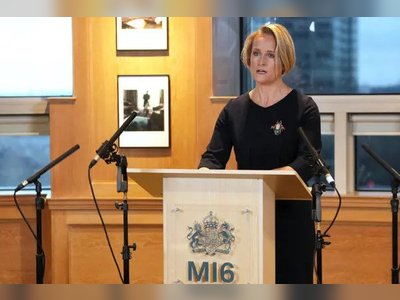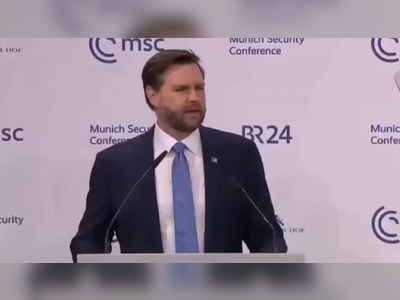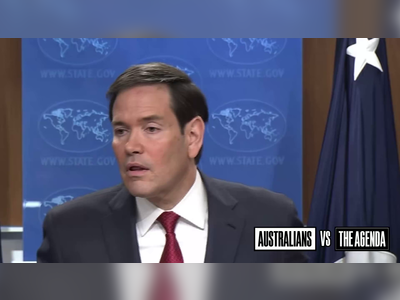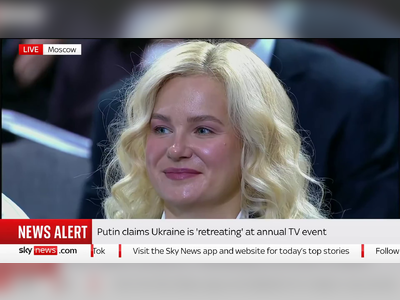Elon Musk's Dialogue with Alice Weidel at the Intersection of Technology and Politics
A discussion on the X platform highlights tensions around media influence and political narratives
On January 9, 2025, Elon Musk, the renowned tech entrepreneur known for his ventures ranging from electric vehicles to space exploration, engaged in a live discussion on his social media platform, X, with Alice Weidel, the co-leader of Germany's controversial Alternative for Germany (AfD) party.
This dialogue drew significant attention, not only due to Musk's prominent status in the tech world but also because of the contentious positions held by Weidel's party, widely categorized as far-right in the political spectrum.
The conversation was reportedly observed by over 200,000 viewers, as indicated by data from X, and delved into a range of pressing issues.
Among these were discussions centered on Germany's energy policies, migration challenges, and the intricate geopolitical landscape, notably including the country's reliance on Russian gas amidst the ongoing conflict in Ukraine.
In a pointed critique, Weidel targeted former Chancellor Angela Merkel, labelling her 'Germany's first green chancellor' and criticizing her 2015 'open-door' migration policy, which she argued had far-reaching negative consequences.
The exchange between Musk and Weidel has not gone without scrutiny.
Marietje Schaake, a fellow at Stanford University, characterized the interaction as 'awkward, uncomfortable, and underwhelming.' Schaake, known for her critical stance on Musk's platforms, has previously suggested that the algorithms and content strategies employed by social media could unintentionally amplify far-right ideologies, though such claims have yet to be proven definitively.
A key segment of the dialogue involved the branding of the AfD as a far-right entity.
Weidel insisted on a 'libertarian' description for her party, despite an ongoing investigation into the party for potential links to extremism.
The discussion traversed various rigorous fact-checking exercises, examining claims related to Merkel’s immigration policies, Germany’s energy strategies, and the political positioning of the AfD itself.
Among contentious points discussed was Weidel's characterization of Merkel's migration policy as opening Germany's borders to illegal immigration in 2015.
Fact-checks clarify that while Germany indeed allowed a significant influx of refugees under Merkel’s direction, the legalities were complex and the situation was not a simple 'opening' of borders.
Another critical area of debate was nuclear energy; Weidel's labeling of nuclear power as 'carbon-free' was met with rebuffs from comprehensive studies which, while acknowledging low lifecycle emissions, confirm that nuclear energy is not entirely free of carbon emissions.
The rise of the AfD, owing partly to its effective use of social media campaigns on platforms like TikTok, was underscored as an indication of the party’s expanding reach.
This pattern mirrors strategies used by other populist movements worldwide, resonating with methodologies famously employed by political figures such as former U.S. President Donald Trump.
The dialogue concluded with a philosophical discourse on the potential colonization of Mars and theism, showcasing Musk's zeal for space exploration contrasted with Weidel's agnostic perspective.
Although Musk's willingness to engage with figures like Weidel is stirring debates on media responsibility and political engagement, it highlights the rapidly changing dynamics of political discourse in the digital era.
As observers continue to assess this evolving landscape, questions about media influence, political alliances, and the balance of power in public debates remain central to discussions across transatlantic corridors.
This dialogue drew significant attention, not only due to Musk's prominent status in the tech world but also because of the contentious positions held by Weidel's party, widely categorized as far-right in the political spectrum.
The conversation was reportedly observed by over 200,000 viewers, as indicated by data from X, and delved into a range of pressing issues.
Among these were discussions centered on Germany's energy policies, migration challenges, and the intricate geopolitical landscape, notably including the country's reliance on Russian gas amidst the ongoing conflict in Ukraine.
In a pointed critique, Weidel targeted former Chancellor Angela Merkel, labelling her 'Germany's first green chancellor' and criticizing her 2015 'open-door' migration policy, which she argued had far-reaching negative consequences.
The exchange between Musk and Weidel has not gone without scrutiny.
Marietje Schaake, a fellow at Stanford University, characterized the interaction as 'awkward, uncomfortable, and underwhelming.' Schaake, known for her critical stance on Musk's platforms, has previously suggested that the algorithms and content strategies employed by social media could unintentionally amplify far-right ideologies, though such claims have yet to be proven definitively.
A key segment of the dialogue involved the branding of the AfD as a far-right entity.
Weidel insisted on a 'libertarian' description for her party, despite an ongoing investigation into the party for potential links to extremism.
The discussion traversed various rigorous fact-checking exercises, examining claims related to Merkel’s immigration policies, Germany’s energy strategies, and the political positioning of the AfD itself.
Among contentious points discussed was Weidel's characterization of Merkel's migration policy as opening Germany's borders to illegal immigration in 2015.
Fact-checks clarify that while Germany indeed allowed a significant influx of refugees under Merkel’s direction, the legalities were complex and the situation was not a simple 'opening' of borders.
Another critical area of debate was nuclear energy; Weidel's labeling of nuclear power as 'carbon-free' was met with rebuffs from comprehensive studies which, while acknowledging low lifecycle emissions, confirm that nuclear energy is not entirely free of carbon emissions.
The rise of the AfD, owing partly to its effective use of social media campaigns on platforms like TikTok, was underscored as an indication of the party’s expanding reach.
This pattern mirrors strategies used by other populist movements worldwide, resonating with methodologies famously employed by political figures such as former U.S. President Donald Trump.
The dialogue concluded with a philosophical discourse on the potential colonization of Mars and theism, showcasing Musk's zeal for space exploration contrasted with Weidel's agnostic perspective.
Although Musk's willingness to engage with figures like Weidel is stirring debates on media responsibility and political engagement, it highlights the rapidly changing dynamics of political discourse in the digital era.
As observers continue to assess this evolving landscape, questions about media influence, political alliances, and the balance of power in public debates remain central to discussions across transatlantic corridors.
AI Disclaimer: An advanced artificial intelligence (AI) system generated the content of this page on its own. This innovative technology conducts extensive research from a variety of reliable sources, performs rigorous fact-checking and verification, cleans up and balances biased or manipulated content, and presents a minimal factual summary that is just enough yet essential for you to function as an informed and educated citizen. Please keep in mind, however, that this system is an evolving technology, and as a result, the article may contain accidental inaccuracies or errors. We urge you to help us improve our site by reporting any inaccuracies you find using the "Contact Us" link at the bottom of this page. Your helpful feedback helps us improve our system and deliver more precise content. When you find an article of interest here, please look for the full and extensive coverage of this topic in traditional news sources, as they are written by professional journalists that we try to support, not replace. We appreciate your understanding and assistance.











